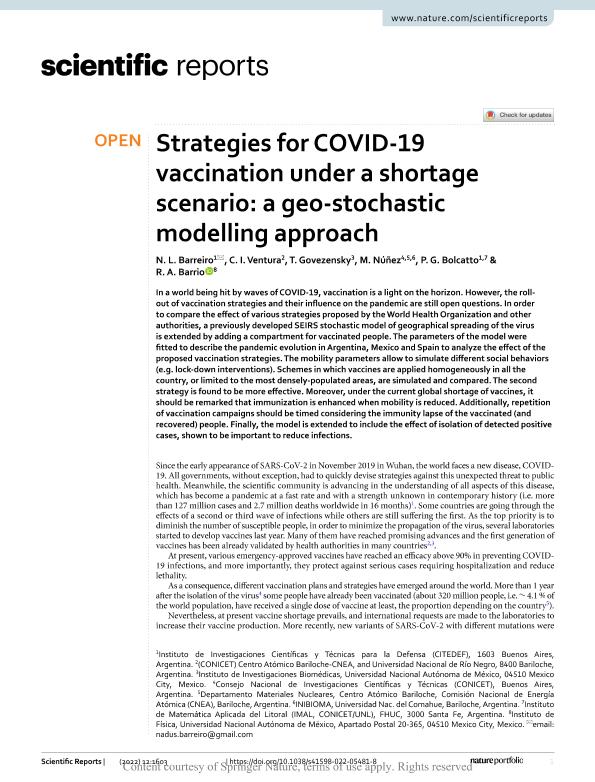Artículo
Strategies for COVID-19 vaccination under a shortage scenario: a geo-stochastic modelling approach
Barreiro, Nadia Luisina; Ventura, Cecilia Ileana ; Govezensky, T.; Nuñez, Matias
; Govezensky, T.; Nuñez, Matias ; Bolcatto, Pablo Guillermo
; Bolcatto, Pablo Guillermo ; Barrio, R. A.
; Barrio, R. A.
 ; Govezensky, T.; Nuñez, Matias
; Govezensky, T.; Nuñez, Matias ; Bolcatto, Pablo Guillermo
; Bolcatto, Pablo Guillermo ; Barrio, R. A.
; Barrio, R. A.
Fecha de publicación:
01/2022
Editorial:
Nature
Revista:
Scientific Reports
ISSN:
2045-2322
Idioma:
Inglés
Tipo de recurso:
Artículo publicado
Clasificación temática:
Resumen
In a world being hit by waves of COVID-19, vaccination is a light on the horizon. However, the roll-out of vaccination strategies and their influence on the pandemic are still open questions. In order to compare the effect of various strategies proposed by the World Health Organization and other authorities, a previously developed SEIRS stochastic model of geographical spreading of the virus is extended by adding a compartment for vaccinated people. The parameters of the model were fitted to describe the pandemic evolution in Argentina, Mexico and Spain to analyze the effect of the proposed vaccination strategies. The mobility parameters allow to simulate different social behaviors (e.g. lock-down interventions). Schemes in which vaccines are applied homogeneously in all the country, or limited to the most densely-populated areas, are simulated and compared. The second strategy is found to be more effective. Moreover, under the current global shortage of vaccines, it should be remarked that immunization is enhanced when mobility is reduced. Additionally, repetition of vaccination campaigns should be timed considering the immunity lapse of the vaccinated (and recovered) people. Finally, the model is extended to include the effect of isolation of detected positive cases, shown to be important to reduce infections.
Archivos asociados
Licencia
Identificadores
Colecciones
Articulos(CCT - PATAGONIA NORTE)
Articulos de CTRO.CIENTIFICO TECNOL.CONICET - PATAGONIA NORTE
Articulos de CTRO.CIENTIFICO TECNOL.CONICET - PATAGONIA NORTE
Articulos(INIBIOMA)
Articulos de INST. DE INVEST.EN BIODIVERSIDAD Y MEDIOAMBIENTE
Articulos de INST. DE INVEST.EN BIODIVERSIDAD Y MEDIOAMBIENTE
Citación
Barreiro, Nadia Luisina; Ventura, Cecilia Ileana; Govezensky, T.; Nuñez, Matias; Bolcatto, Pablo Guillermo; et al.; Strategies for COVID-19 vaccination under a shortage scenario: a geo-stochastic modelling approach; Nature; Scientific Reports; 12; 1; 1-2022; 1-12
Compartir
Altmétricas



